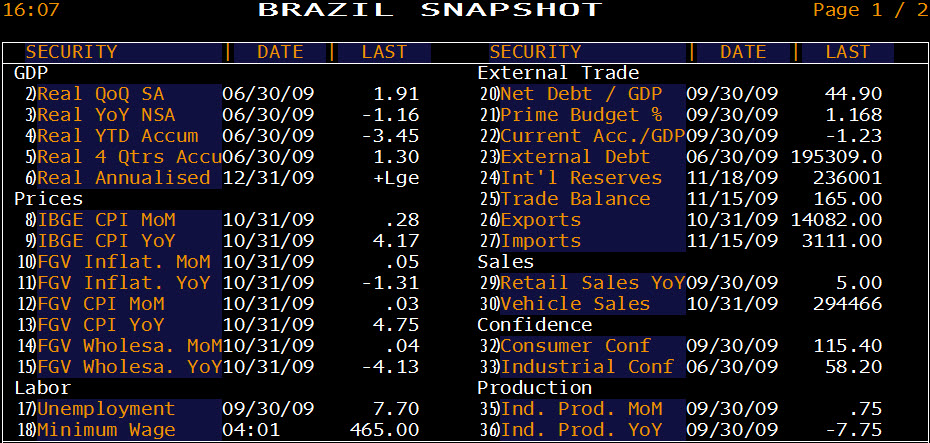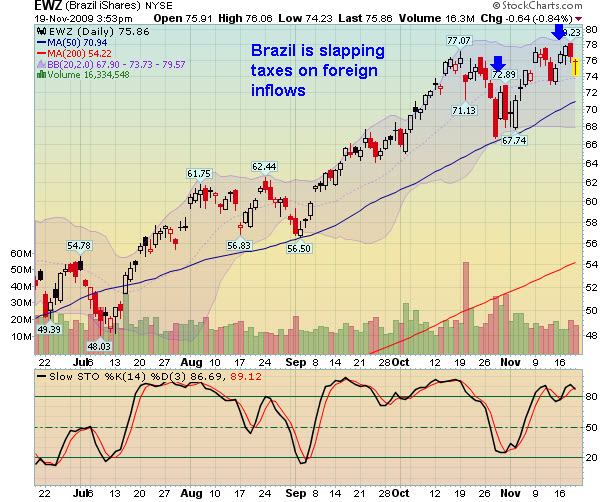We like Brazil for a whole host of reasons. Some being the population growth, some being the vast commodities that actually back their economy. Then there is the great deep-well oil through PetroBras (PBR). Of course we have liked the juicy returns that we received as investors in the sector this year and the outlook for the next 12 months.
BUT… The latest moves to cool the appreciation of the Real (Brazil’s dollar) has us wondering the lengths that they will go to scare of foreign capital. Just a couple of weeks a go they slapped on a 2% tax for foreign inflows and yesterday we hear that Brazilian ADRs will have a 1.5% tax added that they hope will slow speculation.
If you consider that the Bovesta can churn out a gain or loss of 2% in a matter of hours, who is the rather insignificant tax going to deter? Obviously not many. Sure the initial announcement sent their market’s shares down close to 8% before turning around to make new highs within 24 hours, just 2 weeks ago. But it was obviously not enough of a deterrent as the another 1.5% tax had to be added. What is next and how hard does the Brazilian government need to push?
Is their economy overheating and are they telling us that there is apparent and rampant speculation that they believe is going to bring an imminent collapse? From the table below, we see that the economy is recovering, confidence is high and unemployment is lower than most of the developed nations. Wait and watch this one carefully.
From Bloomberg
Brazil‘s `Bizarre‘ Taxes May Hurt Confidence, Federated Says
Nov. 19 (Bloomberg) — Brazil‘s “bizarre” tax measures aimed at stemming the biggest currency rally in emerging markets threaten to undo a surge in investor confidence in the economy, said Federated Investors Inc.
“The hot money‘s going there because people have confidence in what‘s going on in the country, so I don‘t know why they are trying to shoot down that confidence,” Geoffrey Pazzanese, who helps manage about $29.1 billion at Pittsburgh- based Federated, said in an interview. “It‘s a bit bizarre.”
Brazil will begin taxing the issuance of depositary receipts in international markets in a bid to prevent companies from selling shares abroad rather than locally, the Finance Ministry said yesterday after the close of local markets.
A tax of 1.5 percent will be levied starting today on the creation of depositary receipts by companies or investors converting local shares, Economic Policy Secretary Nelson Barbosa told reporters in Brasilia. He said the move will “balance” out distortions caused by a 2 percent tax that was imposed Oct. 19 on foreign investment in local bonds and stocks in a bid to stem a currency rally.
Foreign inflows slowed after the tax, spurring concern from BM&FBovespa SA, the operator of Latin America‘s largest exchange, that investors would choose to invest in Brazilian stocks trading in overseas markets rather than in Sao Paulo. Edemir Pinto, chief executive officer of BM&FBovespa, met with Finance Minister Guido Mantega last month in Brasilia to lobby for a removal of the IOF tax. Pinto said Nov. 6 the tax had been “harmful” to Brazilian markets.
A Sao Paulo-based spokesman at BM&FBovespa declined to comment. The New York Stock Exchange had no comment, spokesman Christiaan Brakman said in an e-mailed statement.
`Drought‘
“The main purpose seems to be avoiding a drought of portfolio inflows — somewhat in contrast with the whole idea behind the first IOF tax,” IDEAGlobal economist Alvise Marino wrote in a note to clients.
Brazilian companies are selling goods abroad at a loss after the real‘s rally this year, Jose Augusto de Castro, vice- president of the Brazilian Foreign Trade Association, said Nov. 5. Further strengthening in the real may drive away foreign visitors before Rio de Janeiro hosts the 2016 Olympics, Tourism Minister Luiz Barretto said on Oct. 30.
“This is one of the worst ways to stem the pressure for real appreciation and doesn‘t deal with the underlying reasons,” Douglas Smith, chief economist for the Americas at Standard Chartered Bank in New York, wrote in a note to clients.
Real Rally
The real has rallied 34 percent this year against the dollar, the most among emerging markets. Mantega said the gains threaten the country‘s exports when he implemented the so-called IOF tax on Oct. 19. The currency has been little changed since then, slipping 0.4 percent to 1.755 per dollar.
“To the government, the IOF worked,” said Tony Volpon, Latin America strategist at Nomura Securities International Inc. in New York. “In their view, it reduced the foreign exchange appreciation.”
The real declined 0.8 percent yesterday to 1.7255 per dollar and the Bovespa, up 77 percent this year, slid 1.3 percent. The iShares MSCI Brazil Fund, an exchange-traded fund, dropped 1.6 percent.
Brazil‘s $1.6 trillion economy grew 1.9 percent in the second quarter from the previous three months. Economists predict gross domestic product will expand 0.2 percent this year and 5 percent in 2010, according to the median estimate of 100 analysts in a central bank survey Nov. 13.
“A lot of countries would die to have the kind of strong economic position that Brazil has, so I don‘t know why they would want to tarnish it,” said Pazzanese, whose firm is the third-biggest U.S. manager of money-market funds.
`Lame Attempt‘
Investors can buy ADRs of Brazilian companies and then cancel the depositary receipts and get the underlying share without paying the IOF tax. With the new measure, the Finance Ministry aims to eliminate the incentive to create new ADRs that allow investors to skirt the levy.
Under the new rule, a company or individual investor that deposits a share with a custodian bank to create a new ADR will be charged the tax at the bank, Barbosa said.
“The whole thing is a ridiculous, very lame attempt to control something they shouldn‘t try to control,” said Greg Lesko, who helps oversee $700 million at Deltec Asset Management in New York. “It‘s a very blunt instrument that‘s not going have the desired effect.”
Petroleo Brasileiro SA and Vale SA, Brazil‘s biggest companies, both have ADRs that trade in New York. Banco do Brasil SA, Latin America‘s biggest bank, said earlier this month that the U.S. had approved plans to begin trading Level 1 ADRs, which are traded over-the-counter. Chief Executive Aldemir Bendine said the ADRs may begin trading by the end of the year.
Slowing Inflows
International investors added 1.14 billion reais ($660 million) of Brazilian stocks to their holdings in October, according to the Web site of BM&FBovespa. Investors bought 52.3 billion reais of stock and sold 51.1 billion reais. Inflows slowed after the government imposed the tax. Net inflows for the month reached 5 billion reais on Oct. 19.
Foreign investment fell to about $308 million a day after the IOF tax, compared with $985 million a day for the first 12 business days of the month, the central bank said Nov. 4.
“These sorts of taxes and controls are a very blunt instrument that could easily backfire,” said Win Thin, senior currency strategist at Brown Brothers Harriman & Co. in New York. “This is a strange measure.”
___
Disclosure: Horowitz & Company clients may hold positions of securities mentioned as of the date published.


















